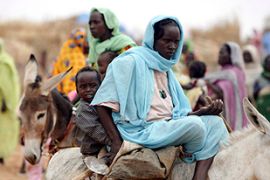Sudan’s ‘brutal’ war on dissent
Human rights group accuses Khartoum of using torture and abuse to quell political dissent

The report details the arrest of at least 34 people in the first half of 2010, including journalists, human rights activists and students.
Researchers found that NISS agents perpetrated a range of human rights violations, including torture, arbitary arrests and violent assault on opponants of the government of Omar al-Bashir, whose ruling National Congress Party won an election marred by claims of fraud in April.
One of those arrested was Ahmed Ali Mohamed Osman, a doctor also known as Ahmed Sardop, who wrote an article criticising Bashir’s decision to expel humanitarian workers from Sudan.
“They leaned me over a chair and held me by my arms and feet while others hit me on the back, legs and arms with something similar to an electrical cable”, he told Amnesty International.
Sardop filed a complaint with the police, and had his claims of torture independently verified by a doctor. But a few days later, he started receiving death threats over the telephone and fled the country.
The report also alleges that women have been subjected to sexual abuse while in NISS custody.
The NISS is responsible for internal security in Sudan, but critics say that as well as torture, it is behind a campaign against freedom of expression.
Since Bashir won April’s election, Amnesty says that NISS agents have restarted daily visits to newspapers and printers aimed at censoring their output. Opposition newspapers have been closed down, and some journalists have been detained without charge.
Amnesty said that the laws governing the security services in Sudan allowed agents to operate with impunity and called for them to be overhauled.
“The National Security Act must be reformed so that agents are no longer provided with extensive powers of arrest and detention. All immunities should be removed,” van der Borght said.
The report comes a week after the International Criminal Court charged Bashir with genocide over the seven-year conflict in the region.
The Sudanese president already faced war crimes charges and charges of crimes against humanity over his government’s alleged use of Arab militias in Darfur, a vast arid region of the country that has been the scene of a bloody civil war between ethnic minorities and government loyalists since 2003.
The government responded by expelling two top overseas relief officials from the capital Khartoum. Amnesty International has been banned from Sudan since 2006 and carried out research for the report from Uganda and Eastern Chad.